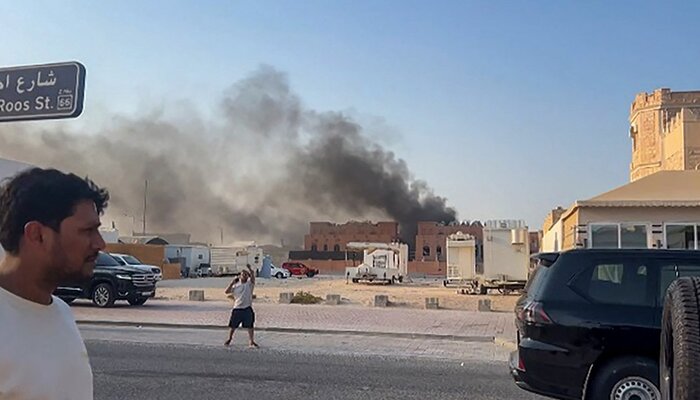
The Israeli strikes on Qatar, carried out on September 9, 2025, have drawn sharp reactions across the world. The attack, which targeted the Hamas political bureau in a residential district of Doha, marked the first time Israel launched an operation on Qatari soil. Many world leaders condemned the strikes, describing them as a violation of sovereignty and international law. The Israeli strikes on Qatar have since become a flashpoint in international diplomacy, forcing allies and rivals alike to issue strong statements.
Trump Calls Incident “Unfortunate”
United States President Donald Trump expressed displeasure over the attack. He called it “very unfortunate” and argued that the operation served neither U.S. nor Israeli interests.
According to reports, Trump had instructed his aide Steve Witkoff to alert Qatari authorities about the planned strike. However, the warning reached too late to prevent the operation. Afterward, Trump personally assured Qatar’s Emir that such an incident would not be repeated. His remarks signaled Washington’s discomfort with the escalation, even as the U.S. remains Israel’s closest ally.
United Nations Condemns Sovereignty Violation
UN Secretary-General António Guterres strongly condemned the airstrikes. He labeled them a “flagrant violation” of Qatar’s sovereignty and territorial integrity.
Guterres highlighted Qatar’s role in international mediation, especially in ceasefire negotiations and hostage-release efforts. He urged all parties to step back from escalation and focus on peace-building initiatives. His statement reflected growing UN concern about the destabilizing ripple effects of the Israeli strikes on Qatar.
Qatar Responds with Defiance
Qatar’s leadership denounced the operation in the strongest terms. Prime Minister Sheikh Mohammed bin Abdulrahman Al-Thani described the airstrikes as a “blatant attack” and declared that Qatar reserved the right to respond.
The Qatari Foreign Ministry echoed this stance. It called Israel’s actions “reckless” and a “cowardly violation of international norms.” Doha also urged neighboring states to coordinate a regional response, warning that unchecked aggression could destabilize the Gulf region.
European Union Warns of Regional Instability
The European Union issued a statement condemning the operation. EU officials said the attack represented a violation of international law and risked igniting a broader regional conflict.
By stressing the dangers of escalation, the EU signaled its concern that the Israeli strikes on Qatar could fuel tensions already present in the Middle East. Calls for restraint came alongside appeals for renewed dialogue.
United Kingdom Criticizes Breach of Sovereignty
British Prime Minister Keir Starmer condemned the airstrikes as a “breach of sovereignty.” He cautioned that unilateral actions of this nature could deepen instability in the Gulf region.
Starmer emphasized the need for restraint and pressed for renewed diplomatic efforts to de-escalate the crisis. The UK’s response aligned closely with its traditional position of supporting dialogue while respecting territorial integrity.
Read: Qatar Bombing Strains Trump-Netanyahu Alliance
Canada Decries Expansion of Violence
Canadian Prime Minister Mark Carney joined the chorus of international criticism. He described the attack as “an intolerable expansion of violence and an affront to Qatar’s sovereignty.”
Carney warned that even if Israel’s objectives were security-driven, the airstrikes undermined ongoing peace talks and hostage negotiations—areas where Qatar has played a constructive role. Canada’s stance reinforced global fears that the Israeli strikes on Qatar could derail fragile diplomatic efforts.
Ghana Expresses Deep Concern
The government of Ghana expressed “deep concern” over the strikes. Officials described the attack as “unprovoked” and a clear breach of international law.
President Nana Akufo-Addo extended solidarity to Qatar’s Emir and citizens. He praised Qatar’s diplomatic contributions and warned that such aggression threatened to derail emerging peace efforts in the region. Ghana’s statement underscored how even nations outside the immediate conflict zone view the escalation as destabilizing.
Malaysia Issues Strong Condemnation
Malaysian Prime Minister Anwar Ibrahim condemned the strikes as a “wanton act of aggression.” He called them a blatant violation of sovereignty and a grave breach of international law.
Anwar emphasized that the attack endangered civilian lives and reflected “utter contempt for peace and diplomacy.” Malaysia declared full solidarity with Qatar and urged the international community to hold Israel accountable. Its firm tone highlighted growing outrage across Asia and the Muslim world.
Saudi Arabia Warns of Consequences
Saudi Arabia also condemned the strikes, describing them as brutal Israeli aggression and a direct violation of Qatar’s sovereignty.
The Saudi Foreign Ministry warned that repeated acts of this nature could lead to “serious consequences.” It stressed that Israel’s actions represented a clear breach of international law and violated established global norms. Riyadh’s warning reflected both its rivalry with Israel and its concern for regional stability.
Broader Diplomatic Implications
The global reaction to the Israeli strikes on Qatar reveals deep concern over the precedent set by attacking sovereign territory far from active battle zones. While Israel argued that the operation targeted Hamas leadership, the strike drew nearly universal condemnation from states across different continents.
For Qatar, the attack poses a challenge to its longstanding role as a mediator in Middle Eastern conflicts. By striking in Doha, Israel risked undermining the very channels used for ceasefire talks and humanitarian negotiations. This explains why even allies of Israel, such as the U.S. and the UK, criticized the operation.
What Comes Next
The international fallout continues to build. Qatar’s leaders are rallying regional and global support, while Israel faces mounting diplomatic pressure. The Israeli strikes on Qatar have opened a new chapter in Middle Eastern tensions, one where questions of sovereignty, law, and diplomacy collide.
As global powers watch closely, the coming weeks will determine whether this incident sparks wider escalation or drives renewed efforts for peace. Either outcome will reshape not just Israel-Qatar relations but also the broader dynamics of the Gulf and the Middle East.
Follow us on Instagram, YouTube, Facebook,, X and TikTok for latest updates
